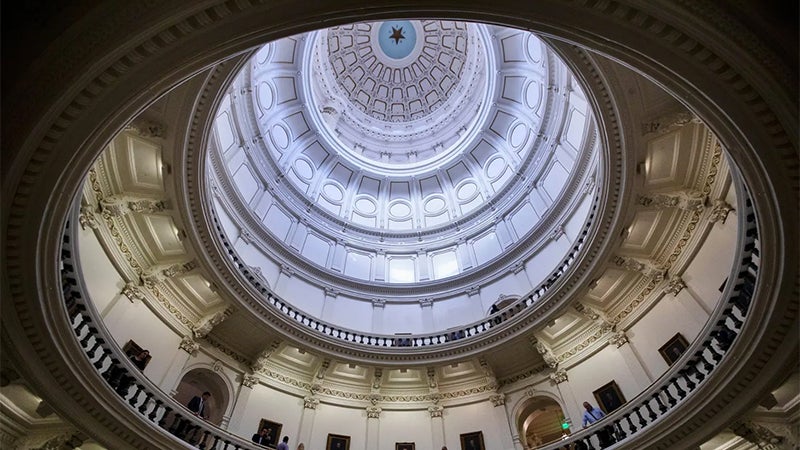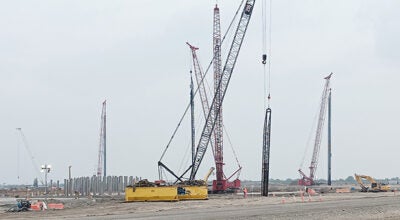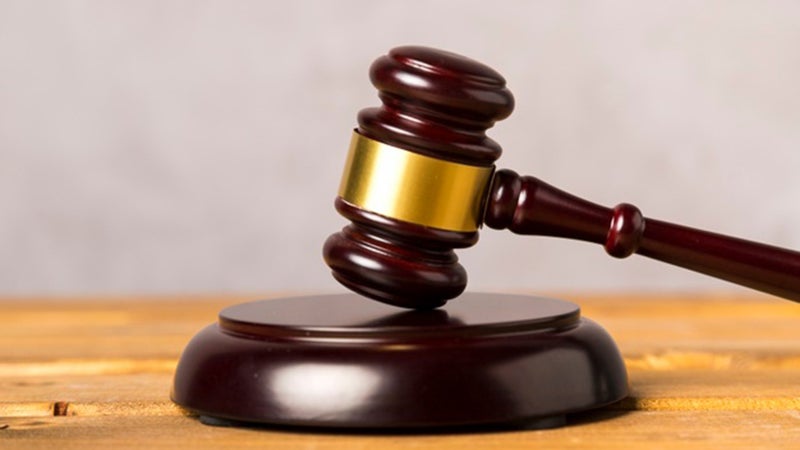Texas Republicans eye 2022 — and beyond — after romping in November election
Published 10:30 am Monday, November 23, 2020

- The rotunda at the state Capitol. (Miguel Gutierrez Jr./The Texas Tribune)
|
Getting your Trinity Audio player ready...
|
The day before the Nov. 3 election, U.S. Sen. Ted Cruz, R-Texas, was in Corpus Christi about to begin a stump speech in support of the state’s senior senator, John Cornyn, when someone began chanting about an election — but not the imminent one.
“Cruz 2024! Cruz 2024!”
It was a small reminder that, as all-consuming the 2020 election was for Texas Republicans, many eyes had already begun to shift beyond it. Every statewide elected official is up for reelection in 2022 — a ticket led by Gov. Greg Abbott — and speculation is already simmering about whether a Texan will run for president two years later, which could set off a dramatic round of political dominoes.
Democrats, meanwhile, suffered devastating setbacks on Nov. 3, dampening the appetite for any immediate post-election maneuvering for 2022.
Abbott’s bid for a third term will be the marquee contest in two years, and at least before the latest election, Beto O’Rourke or Julián Castro were among the names most discussed as potential Democratic challengers. But Abbott could also face a credible primary opponent, and the new Texas GOP chairman, Allen West, has stoked speculation that he could step up with his striking splits with the governor on his coronavirus response.
Abbott has said he is “100%” running for reelection but more recently breathed new life into long-lingering rumors he is thinking about a White House run.
After 2022, Abbott said in a recent radio interview, “we’ll see what happens.”
Cruz appears a more likely bet for the next presidential race. He has not concealed his interest in running for president again after falling short in 2016, and 2024 would bring an additional layer of political intrigue because he is also up for reelection that year.
Asked in August if he will run for president in 2024, Cruz replied: “I don’t know for sure. I hope to run again.”
Another bid for Cruz?
Cruz spent the latest election cycle tending to his national profile and further building intraparty relationships that could pay off down the road. He launched a “20 for 20” fundraising committee that promised to raise at least $100,000 each for 25 conservative congressional candidates. He spent the final days of the November election hitting five states in five days to campaign for Senate colleagues in competitive races. And he plans to join other potential 2024 candidates in visiting Georgia ahead of the January runoff there with two Republican-held Senate seats on the line.
“I’ve spoken with both David Perdue and Kelly Loeffler, the two senators, I’ve told them I’m all in, anything I can do to help, the answer is yes,” Cruz said in a TV interview after the runoffs were set.
Cruz has also used the post-election period to closely align himself with President Donald Trump’s refusal to concede, likely a recognition that Trump will remain a force within the party for the foreseeable future and that Cruz can ill-afford to alienate Trump’s loyalists.
Cruz was Trump’s closest competitor in the 2016 primary. He was one of the last candidates to drop out of the race and ultimately finished second to the future president in the delegate count.
Unlike the last time Cruz ran for president, though, he is up for reelection to his U.S. Senate seat in 2024, which poses a couple interesting hypothetical scenarios. Texas’ “LBJ law” — named after the former president from the state — allows a senator to seek reelection and the presidency at the same time. If Cruz were not to take advantage of that, he would have to decide by the candidate filing deadline — typically early December in the year prior — whether to move forward with a reelection bid or presidential campaign.
If Cruz were to forgo running for reelection, it would likely cause a scramble among both Democrats and Republicans for a rare open U.S. Senate seat.
Abbott’s eyes on 2022
Abbott faces a more straightforward sequence. He is up for reelection in 2022 and then can run for president two years later.
It is a path that has been traveled by Abbott’s two predecessors, Rick Perry and George W. Bush, and until recently, Abbott has enjoyed broad statewide popularity. His approval ratings dropped this summer and he faced backlash from a handful of hardline conservatives in his party amid his handling of the coronavirus pandemic, though he is riding new political momentum after the Nov. 3 election, when his campaign spent millions of dollars to help defend the state House GOP majority.
In the recent radio interview, he took care to note he is first focused on securing a third term. Speaking with Dallas radio host Mark Davis, Abbott said: “You know, one thing that you know about me, and that is I take one step at a time, and the first step is to win reelection, and after that, Mark, we’ll see what happens.”
Abbott got a question on the same topic during a TV interview later the same day and said his current priorities were the state’s coronavirus response and the upcoming legislative session. When the anchor said he would take that as a “maybe” on 2024, Abbott replied, “I’m focused on first things first.”
“We’ve been working on [Abbott’s 2022 reelection campaign] literally since the day after ‘18,” Abbott political guru Dave Carney told reporters the morning after the Nov. 3 election, predicting Abbott’s reelection race would probably cost $100 million given the money that flooded into Texas for the latest election. “It’s gonna be a battle.”
Asked if he expected Abbott to face a primary challenge from his right, Carney responded, “I don’t know, but we’ll be prepared.”
Much of the speculation about an Abbott primary challenge has centered on West, who has not ruled it out while grabbing attention with moves like suing Abbott over his extension of this November’s early voting period and protesting outside the Governor’s Mansion over pandemic-related business closures. Abbott has all but ignored West.
While Abbott’s team was thrilled to use O’Rourke as a boogeyman in the latest election — and would no doubt relish running against him in 2022 — Carney bet that O’Rourke would not challenge Abbott due to Biden’s larger-than-expected deficit here on Nov. 3.
The next most common names that come up on the Democratic side are the Castro brothers — former presidential candidate Julián Castro and U.S. Rep. Joaquin Castro of San Antonio. Neither has ruled out a run for statewide office in 2022 — or 2024 — according to a person close to them who was not authorized to discuss the matter publicly. But they may have other options in the nearer term as Biden assembles his cabinet, and Joaquin Castro has remained focused on his bid to lead the House Foreign Affairs Committee.
Looming over the speculation about potential Abbott challengers is the question of just how vulnerable he truly is. Trump’s 6-percentage-point win here this month tempered some enthusiasm about the state turning purple. Abbott won his last two gubernatorial campaigns by double digits. Abbott is a mammoth fundraiser with a huge war chest. And in 2022, he will be running in a non-presidential election year that is expected to favor Republicans.
Plus, based on his previous campaigns, Abbott can be expected to compete seriously for the Latino vote, a new source of optimism for Texas Republicans after the Nov. 3 results.
Democrats argue they still have a chance.
“I think the lessons of 2018 still stand, which is that a good candidate with a massive small-dollar fundraising operation and a volunteer turnout operation is likely to be within striking distance in 2022,” said Zack Malitz, the board member and a treasurer of Beat Abbott PAC, a group laying the groundwork to unseat Abbott in 2022.
Like Castro, Malitz said 2022 will be different from 2020, and “I think we’re gonna have something much more like 2018 where the focus will be on the villainy of our statewide Republicans.” The coronavirus crisis, Malitz added, has “shattered the illusion that Greg Abbott is unassailable.”
Future for Democrats uncertain
But for Democrats, the immediate focus is on sifting through the wreckage of the latest election, which saw the implosion of their hopes of flipping the state at the presidential level and making major down-ballot inroads. They also are taking a fresh look at improving their standing with Latino voters, key to any future Democratic dominance statewide, and why Joe Biden underperformed in large swaths of South Texas.
In 2016, Trump lost the 28 counties on or along the Texas-Mexico border by 33 points. This year, his deficit in that region was only 17 points.
“I think the first step, like I said, is to understand what happened and to understand also … in several areas of the state, Latino support for the Democratic presidential candidate actually improved in 2020 versus 2016, and then to go and address what happened along those border communities,” Julián Castro said during a post-election conference call with reporters.
Castro said he was “confident” those problems can be fixed by 2022. And he made the case that 2022 in Texas will be “quite different” from 2020, with no presidential election on the ballot and thus the opportunity for a brighter spotlight on controversy and scandal in state government.
O’Rourke has been open about his disappointment with the latest election results. He spearheaded a massive effort through his Powered by People group to flip the Texas House and win the state for Biden, and if either scenario had come to fruition, he would have emerged from Nov. 3 a formidable 2022 prospect.
O’Rourke has said little about his political future since the election, aside from a Nov. 11 podcast with Amanda Edwards, the former U.S. Senate candidate, in which he urged perseverance for Texas Democrats.
“I think the only way out of our predicament is through,” O’Rourke said, “and I for one want to be part of the team that wants us to get through, in whatever capacity I can be part of.”
Others looking to move up
Abbott’s reelection campaign is not the only part of the 2022 statewide ticket that could see drama. Land Commissioner George P. Bush, grandson of former President George H.W. Bush and nephew of former President George W. Bush, has made little secret that he is interested in moving up, though he has said he would not challenge Abbott or Lt. Gov. Dan Patrick. That has not stopped Patrick from moving aggressively to contrast with Bush on the most politically sensitive issue in his portfolio: his office’s management of the Alamo.
Bush more recently left the door open to specifically running against Attorney General Ken Paxton, who remains under indictment for felony securities fraud charges and is now navigating a stormy period after facing a mutiny from his senior staff and FBI investigation.
Paxton’s team has said he is “absolutely” running for a third term. He was among the statewide officials who saw an unexpectedly close race in 2018, and his Democratic challenger that year, Justin Nelson, said he is still considering whether to run for office in 2022 and has not made a decision yet.
While there has not been as much open speculation about Patrick’s reelection run, he has said it would be for his last term, a signal to potential opponents that they could wait four more years for an open seat.
Agriculture Commissioner Sid Miller could also try to make moves in 2022. He has joined West in criticizing Abbott’s coronavirus handling, and in a statement for this story, Miller’s campaign appeared to keep his options open beyond seeking another term in his current position.
“Commissioner Miller’s name will be on the Republican primary ballot in 2022,” Miller spokesperson Todd Smith said.
Beyond incumbents, there are some GOP names that have lingered in the background as potential statewide contenders. They include former state House Speaker Joe Straus, a moderate Republican who did not seek reelection and has since stayed involved in policy and political debates. He said Wednesday he has no current plan to run statewide but added, “I keep my options open.”
“Let’s let the dust settle and see who’s out there in the future, but it’s not something I wake up in the morning and miss being in public office,” Straus said during a panel discussion hosted by KERA in Dallas.
Any discussion of Texas Republicans with potential for higher office also includes U.S. Rep. Dan Crenshaw of Houston, a national rising star who is coming off a resounding reelection win despite being targeted by national Democrats. While Crenshaw has not expressed interest either way, he has been mentioned as both a possible statewide candidate and a 2024 presidential hopeful.
For Democrats going forward, a central question is who comprises their bench beyond O’Rourke and the Castros. Some who are interested in a fresher face have brought up Lina Hidalgo, the young Harris County judge who unexpectedly won the job two years ago. But Hidalgo has said she plans to run for a second term in 2022, and an aide reiterated that for this story.
There is also Cristina Tzintzún Ramirez, who came in a close third in the U.S. Senate primary earlier this year, missing the runoff. The seasoned organizer has since kept a robust political profile, doling out endorsements in down-ballot races and launching a super PAC, Latino Families Forward, dedicated to tapping the potential of the Latino vote in Texas.
Always in the background, too, is talk of a celebrity candidate, and actor Matthew McConaughey, who lives in Austin, made headlines this week by telling conservative radio host Hugh Hewitt that he would consider running for Texas governor. However, in a subsequent interview with late-night TV host Stephen Colbert, McConaughey said the sudden buzz was overblown.
“I have no plans to do that right now,” McConaughey said.
— By Patrick Svitek of The Texas Tribune, a nonpartisan, nonprofit media organization that informs Texans — and engages with them – about public policy, politics, government and statewide issues.





